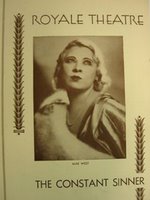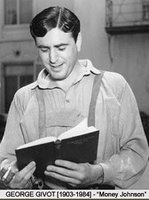
• • Set in Harlem, the play opened on 14 September 1931 and ran for only 64 performances on Broadway.
• • The Great Depression increased the number of jobless adults and, by 1931, the unemployment rate had reached nearly 16 percent. Obviously, the bleak economic downturn took a bite out of the box office, lowering everyone's prospects for profitability — — not only Mae West's productions. But the storyline of "The Constant Sinner" — — Babe Gordon's love for Money Johnson, a dark-skinned Harlem hoodlum with a bootlegging empire, kept many theatre-goers away. Miscegenation was a touchy subject in 1931, as Mae West knew. The Harlem Breakfast Club scenes also featured inter-racial couples. Racial attitudes being what they were during the 1930s, several critics who reviewed the play said that these scenes "turn the stomach."
• • Mae West had a large pool of African-American talent to pick from. She cast fourteen black actors and actresses, many with serious stage credentials. However, Mae was not allowed to cast the dashing, debonair actor she really wanted — — LORENZO TUCKER, billed as "The Black Valentino" — — for the role of "Money Johnson."

• • The Shuberts and Jim Timony refused to let Mae West cast a black man as her lover, afraid this would trigger police raids and worse. Forced to give in, Mae agreed to hire vaudevillian George Givot to play the Harlem hotshot during the play's Broadway run. George Givot [shown here in 1936] played the role in blackface. The Shuberts wrote it into his contract that, at the end of each performance, Givot would have to remove his wig to assure the audience that it was a Caucasian who was embracing the curvy blonde "Babe Gordon" [Mae West] onstage.
• • When a detective warns Babe Gordon she is in a tight spot, she shoots back, "I can always handle tight spots."
• • Another suggestive line was this one from Babe Gordon: "COME UP SOMETIME, BOYS," she purrs to a group of guys. "I'LL TELL YOUR FORTUNE."
• • Come up and see Mae every day online: http://MaeWest.blogspot.com/
________
Source:http://maewest.blogspot.com/atom.xml
Mae West
• • Photo: • • Mae West • • 1931 • •
• • Feed — — http://feeds2.feedburner.com/MaeWest
NYC
Mae West.


No comments:
Post a Comment